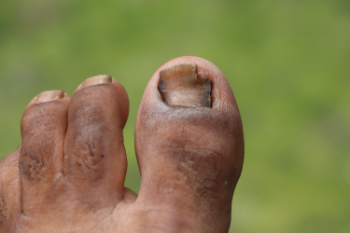

Aching toes can result from various causes, including arthritis, bunions, hammertoes, nerve issues, or even ill-fitting shoes. Conditions like plantar fasciitis, overuse injuries from sports, or long periods of standing may also lead to toe pain. The discomfort can range from mild soreness to sharp, persistent pain, affecting mobility and daily activities. To manage aching toes, it is important to rest and wear comfortable, supportive shoes. A podiatrist can diagnose the underlying cause of toe pain through a thorough exam and imaging scans. They may recommend custom orthotics, targeted exercises, or in severe cases, surgery to address structural problems. Early treatment helps prevent further complications and restores foot function. If you have toe pain that persists or worsens, it is suggested that you visit a podiatrist for care.
Toe pain can disrupt your daily activities. If you have any concerns, contact Dr. Nooshin Zolfaghari of VIP Foot & Ankle Center. Our doctor can provide the care you need to keep you pain-free and on your feet.
What Causes Toe Pain?
Most severe toe pain is caused due to a sports injury, trauma from dropping something heavy on the toe, or bumping into something rigid. Other problems can develop over time for various reasons.
Toe pain can be caused by one or more ailments. The most common include:
When to See a Podiatrist
Diagnosis
In many cases the cause of toe pain is obvious, but in others, a podiatrist may want to use more advanced methods to determine the problem. These can range from simple visual inspections and sensation tests to X-rays and MRI scans. Prior medical history, family medical history, and any recent physical traumatic events will all be taken into consideration for a proper diagnosis.
Treatment
Treatments for toe pain and injuries vary and may include shoe inserts, padding, taping, medicines, injections, and in some cases, surgery. If you believe that you have broken a toe, please see a podiatrist as soon as possible.
If you have any questions please feel free to contact our office located in Pembroke Pines, FL . We offer the newest diagnostic tools and technology to treat your foot and ankle needs.

Gout is a form of arthritis that causes sudden and severe pain, redness, and swelling in the joints, most commonly affecting the big toe. It occurs when uric acid builds up in the bloodstream, forming sharp crystals in the joints. This often leads to intense pain that makes even the lightest touch feel unbearable. Certain foods can trigger gout attacks, particularly those high in purines, which the body converts to uric acid. It is advisable to avoid red meats, organ meats, shellfish, sugary beverages, and alcohol. Instead, focus on a diet rich in fruits, vegetables, and whole grains to help manage uric acid levels. If you are experiencing gout symptoms or have questions about managing this condition, it is important to seek professional guidance. It is suggested you schedule an appointment with a podiatrist to discuss treatment options and preventive strategies, ensuring your feet remain healthy and pain-free.
Gout is a painful condition that can be treated. If you are seeking treatment, contact Dr. Nooshin Zolfaghari from VIP Foot & Ankle Center. Our doctor will treat your foot and ankle needs.
What Is Gout?
Gout is a form of arthritis that is characterized by sudden, severe attacks of pain, redness, and tenderness in the joints. The condition usually affects the joint at the base of the big toe. A gout attack can occur at any random time, such as the middle of the night while you are asleep.
Symptoms
Risk Factors
Prior to visiting your podiatrist to receive treatment for gout, there are a few things you should do beforehand. If you have gout you should write down your symptoms--including when they started and how often you experience them, important medical information you may have, and any questions you may have. Writing down these three things will help your podiatrist in assessing your specific situation so that he or she may provide the best route of treatment for you.
If you have any questions, please feel free to contact our office located in Pembroke Pines, FL . We offer the newest diagnostic and treatment technologies for all your foot care needs.

Stress fractures are small cracks in the bone caused by repetitive stress, often affecting athletes or those who suddenly increase their activity levels. Common symptoms include localized pain that worsens with activity, swelling, tenderness, and sometimes bruising surrounding the affected area. You may also notice pain that eases with rest but returns when you resume activity. Treatment typically involves resting the affected foot or ankle to allow the bone to heal. In more severe cases, a podiatrist might recommend immobilization with a brace or boot to protect the fracture. Gradual return to activity guided by a podiatrist is vital to preventing recurrence. If you suspect a stress fracture or experience persistent foot or ankle pain, it is suggested that you schedule an appointment with a podiatrist. This type of doctor can perform a thorough evaluation and recommend an effective treatment plan to ensure a full recovery.
Stress fractures occur when there is a tiny crack within a bone. To learn more, contact Dr. Nooshin Zolfaghari from VIP Foot & Ankle Center. Our doctor can provide the care you need to keep you pain free and on your feet.
How Are They Caused?
Stress fractures are the result of repetitive force being placed on the bone. Since the lower leg and feet often carry most of the body’s weight, stress fractures are likely to occur in these areas. If you rush into a new exercise, you are more likely to develop a stress fracture since you are starting too much, too soon. Pain resulting from stress fractures may go unnoticed at first, however it may start to worsen over time.
Risk Factors
Stress fractures do not always heal properly, so it is important that you seek help from a podiatrist if you suspect you may have one. Ignoring your stress fracture may cause it to worsen, and you may develop chronic pain as well as additional fractures.
If you have any questions, please feel free to contact our office located in Pembroke Pines, FL . We offer the newest diagnostic and treatment technologies for all your foot care needs.

Early detection of toenail fungus is essential for effective treatment and prevention of complications. Addressing the condition in its initial stages can significantly reduce the risk of the infection spreading to other nails or worsening over time. When identified early, treatment options are generally more straightforward and less invasive, often involving topical antifungal medications. Prompt intervention also helps prevent the toenail from becoming thickened, brittle, or discolored, which can lead to more severe discomfort and difficulty in finding suitable footwear. Furthermore, early diagnosis is particularly important for individuals with underlying health conditions, such as diabetes, who are at higher risk for complications. If you see the beginning stages of toenail fungus, it is suggested that you schedule an appointment with a podiatrist who can offer you treatment remedies, which often includes prescribed medication.
For more information about treatment, contact Dr. Nooshin Zolfaghari of VIP Foot & Ankle Center. Our doctor can provide the care you need to keep you pain-free and on your feet.
Toenail Fungus Treatment
Toenail fungus is a condition that affects many people and can be especially hard to get rid of. Fortunately, there are several methods to go about treating and avoiding it.
Antifungals & Deterrence
Oral antifungal medicine has been shown to be effective in many cases. It is important to consult with a podiatrist to determine the proper regiment for you, or potentially explore other options.
Applying foot powder on the feet and shoes helps keep the feet free of moisture and sweat.
Sandals or open toed shoes – Wearing these will allow air movement and help keep feet dry. They also expose your feet to light, which fungus cannot tolerate. Socks with moisture wicking material also help as well.
If you have any questions please feel free to contact our office located in Pembroke Pines, FL . We offer the newest diagnostic tools and technology to treat your foot and ankle needs.

Ingrown toenails occur when the edge of a toenail grows into the surrounding skin, causing pain, swelling, and sometimes infection. The big toe is most commonly affected. Causes include improper nail trimming, wearing tight or ill-fitting shoes, injury to the toenail, or genetic predisposition. Symptoms of an ingrown toenail include redness, swelling, pain, and tenderness along the side of the nail. If left untreated, the area can become infected, leading to pus, warmth, and increased pain. If you have toe pain and notice symptoms of an ingrown toenail, it is suggested that you visit a podiatrist who can guide you toward effective treatment, which may include partial nail removal.
Ingrown toenails may initially present themselves as a minor discomfort, but they may progress into an infection in the skin without proper treatment. For more information about ingrown toenails, contact Dr. Nooshin Zolfaghari of VIP Foot & Ankle Center. Our doctor can provide the care you need to keep you pain-free and on your feet.
Ingrown Toenails
Ingrown toenails are caused when the corner or side of a toenail grows into the soft flesh surrounding it. They often result in redness, swelling, pain, and in some cases, infection. This condition typically affects the big toe and may recur if it is not treated properly.
Causes
You are more likely to develop an ingrown toenail if you are obese, have diabetes, arthritis, or have any fungal infection in your nails. Additionally, people who have foot or toe deformities are at a higher risk of developing an ingrown toenail.
Symptoms
Some symptoms of ingrown toenails are redness, swelling, and pain. In rare cases, there may be a yellowish drainage coming from the nail.
Treatment
Ignoring an ingrown toenail can have serious complications. Infections of the nail border can progress to a deeper soft-tissue infection, which can then turn into a bone infection. You should always speak with your podiatrist if you suspect you have an ingrown toenail, especially if you have diabetes or poor circulation.
If you have any questions, please feel free to contact our office located in Pembroke Pines, FL . We offer the newest diagnostic and treatment technologies for all your foot care needs.